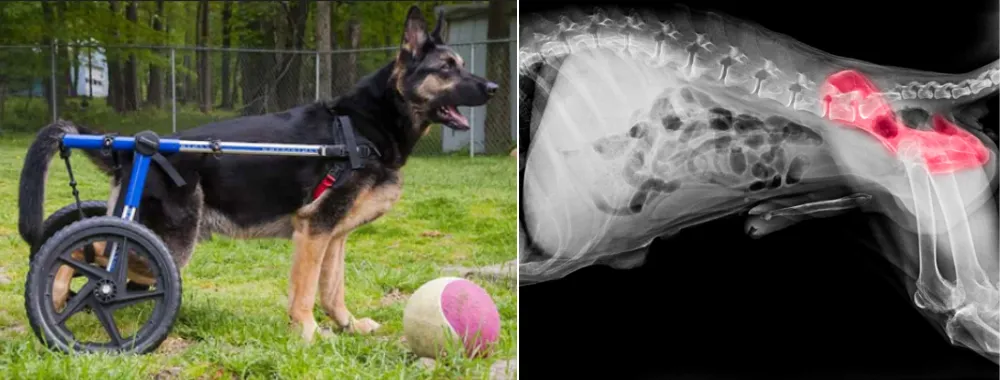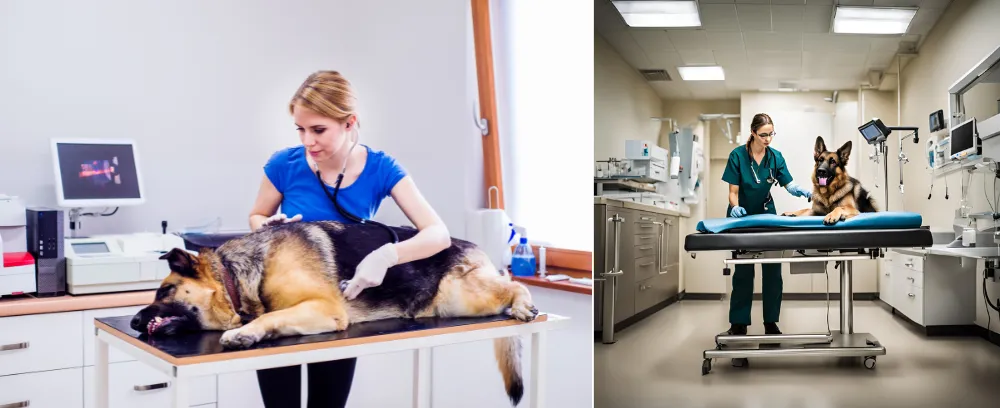Do you want to know about the most common German Shepherd health myths? You’re in the right place.
German Shepherd is one of the most popular and recognizable dog breeds in the world. Known for their intelligence, attraction, loyalty, and versatility, they often become a topic of conversation among dog enthusiasts.
Unfortunately, their popularity also means they’re subject to a lot of misinformation, particularly concerning their health.
In this article, we will go through some of the most common health myths about German Shepherds and provide evidence-based explanations to set the record straight.
- German Shepherds Are Prone to Hip Dysplasia and Always Develop It
- A German Shepherd’s Sloped Back Causes Health Issues
- German Shepherds Are Allergic to Chicken or Grains
- German Shepherds Shouldn’t Exercise Too Much as Puppies
- German Shepherds Don’t Live Long Due to Their Size
- All German Shepherds Will Develop Degenerative Myelopathy (DM)
- German Shepherds Are Aggressive by Nature
- German Shepherds Don’t Need Regular Vet Visits Because They’re Hardy
RELATED
- Role of German Shepherds in Therapy & Emotional Support
- Training German Shepherds for Families With Young Children
- Is German Shepherd Right for Apartment Living?
- Best Way to Take German Shepherd for Walk: A Complete Guide
- Effective Methods for Crate Training German Shepherd Puppy
- Monthly & Annual Expenses of Owning a German Shepherd
- German Shepherd Teeth Problems: Causes, Prevention, Treatment
- Should You Shave a German Shepherd in Summer?
|| DON’T MISS! Today’s Deals on Chewy – Pet Foods, Products, Supplies, Toys and more…
Myth 1: German Shepherds are Prone to Hip Dysplasia and Always Develop It
While it’s true that German Shepherds are genetically predisposed to hip dysplasia, not all of them will develop this condition.
Approximately 20-25% of German Shepherds are affected by hip dysplasia, according to studies and data from organizations like the Orthopedic Foundation for Animals (OFA). The prevalence depends on factors like genetics, breeding practices, and environmental influences.

Responsible breeding practices have significantly reduced the prevalence of hip dysplasia in many German Shepherd lines. Additionally, environmental factors such as diet, weight management, and appropriate exercise during puppyhood play crucial roles in minimizing the risk. Regular vet check-ups and screening through X-rays can help detect and manage the condition early.
Below is a table comparing the prevalence of hip dysplasia in different dog breeds. The percentages are based on general data from canine health studies (e.g., Orthopedic Foundation for Animals).
| Dog Breed | Prevalence of Hip Dysplasia (%) |
|---|---|
| German Shepherd | 20-25% |
| Golden Retriever | 19-21% |
| Labrador Retriever | 11-13% |
| Rottweiler | 20-22% |
| Saint Bernard | 40-50% |
| Bulldog | 70-73% |
| Great Dane | 30-32% |
| Boxer | 10-12% |
| Bernese Mountain Dog | 18-20% |
| Alaskan Malamute | 12-15% |
| Pug | 46-48% |
| Border Collie | 5-8% |
| Australian Shepherd | 4-6% |
| Siberian Husky | 3-5% |
| Dachshund | <5% |
Myth 2: A German Shepherd’s Sloped Back Causes Health Issues
The sloped back, often seen in show-line German Shepherds, is a result of selective breeding for appearance and is not inherently harmful.
However, extreme angulation can lead to improper gait and strain on the hips and spine. It’s important to differentiate between moderate angulation, which is normal for the breed, and excessive sloping, which may increase the likelihood of joint problems.
Working-line German Shepherds generally have straighter backs, and both types can live healthy lives when bred and raised responsibly.

Myth 3: German Shepherds are Allergic to Chicken or Grains
Food allergies in German Shepherds, or any breed, are relatively rare. When they do occur, the culprit is more likely to be a protein like beef, dairy, or chicken, but this is not breed-specific.
Grain allergies are even less common than protein allergies. Many German Shepherds thrive on diets that include grains, and grain-free diets can sometimes lead to other health issues, such as heart disease. Always consult a veterinarian before making drastic dietary changes.

Myth 4: German Shepherds Shouldn’t Exercise Too Much as Puppies
While it’s true that over-exercising a puppy can stress developing joints, controlled and appropriate activity is essential for their growth and development.
German Shepherd puppies benefit from short, frequent play sessions, mental stimulation, and controlled walks. Avoid repetitive high-impact activities like jumping or long-distance running until they’re fully grown, typically around 18 to 24 months. Balance is key to promoting healthy joint development.

Myth 5: German Shepherds Don’t Live Long Due to Their Size
German Shepherds generally live 9–13 years, which is typical for a large breed. Lifespan is influenced by genetics, diet, exercise, and preventive healthcare.
Advances in veterinary medicine and a focus on health-conscious breeding have extended the life expectancy of many German Shepherds. Ensuring regular vet visits, maintaining a healthy weight, and providing mental enrichment can contribute to a longer, healthier life.
Related: How to Extend the Lifespan of German Shepherd

Myth 6: All German Shepherds Will Develop Degenerative Myelopathy (DM)
Degenerative myelopathy is a genetic disease that affects the spinal cord and can lead to mobility issues.
While German Shepherds are one of the breeds most associated with DM, not all are affected. It typically affects dogs in their senior years, leading to progressive paralysis.
Related: Top Rated Reputable German Shepherd Breeders.
About 2-3% of German Shepherds develop Degenerative Myelopathy (DM), though up to 20% may carry the genetic mutation linked to the disease. Not all carriers will develop DM, as it typically requires two copies of the mutated gene. Genetic testing helps breeders reduce its prevalence in the breed.
Below is a table comparing the prevalence of degenerative myelopathy (DM) in various dog breeds. These percentages represent the proportion of dogs carrying the genetic mutation (SOD1 gene) associated with DM, not necessarily those that will develop the disease:
| Dog Breed | Carrier/At-Risk Prevalence (%) |
|---|---|
| German Shepherd | 20-25% |
| Pembroke Welsh Corgi | 30-50% |
| Boxer | 15-20% |
| Chesapeake Bay Retriever | 10-15% |
| Rhodesian Ridgeback | 8-10% |
| Standard Poodle | 5-8% |
| Great Pyrenees | 5-7% |
| Bernese Mountain Dog | 3-5% |
| Golden Retriever | 2-4% |
| Labrador Retriever | <2% |
| Siberian Husky | Rare (<1%) |
| Dachshund | Rare (<1%) |
| Beagle | Rare (<1%) |
Genetic testing can identify whether a dog carries the mutation for DM, allowing breeders to make informed decisions and reduce its prevalence. Even in dogs at risk, a healthy lifestyle and early intervention can improve quality of life.
Myth 7: German Shepherds are Aggressive by Nature
This myth stems from their frequent portrayal as police or guard dogs. German Shepherds are naturally protective but are not inherently aggressive. Their temperament largely depends on breeding, training, and socialization.
A well-socialized German Shepherd is loyal, calm, and confident. Behavioral issues are more likely to arise from improper training or neglect than from any breed-specific tendency toward aggression.

Myth 8: German Shepherds Don’t Need Regular Vet Visits Because They’re Hardy
German Shepherds are a resilient breed, but they still require regular veterinary care to monitor their overall health, including screenings for joint issues, heart conditions, and skin problems.
Preventive care is crucial for catching potential issues early and ensuring they lead healthy lives. Routine check-ups also keep vaccinations, parasite control, and dental health up to date.

Conclusion
German Shepherds are remarkable companions, but misinformation about their health can lead to unnecessary fear or improper care. By debunking these myths, owners can better understand how to support their dog’s health and well-being. The key lies in responsible breeding, proper training, balanced nutrition, and regular veterinary care. With these in place, German Shepherds can thrive and enjoy long, fulfilling lives by their owners’ sides.
If you like this post then don’t forget to share with other people. Share your feedback in the comments section below.
Also Read
- Breeding Frequency for Male German Shepherds
- What is the Average Intelligence of German Shepherds?
- What Health Products Should Every German Shepherd Owner Have?
- How to Know German Shepherd Breeder is Genuine?
- German Shepherd Energy Levels by Age | Activity Needs
- How Does Selective Breeding Affect Dog’s Appearance
- How Do German Shepherds Handle Hot Weather




Leave a Reply